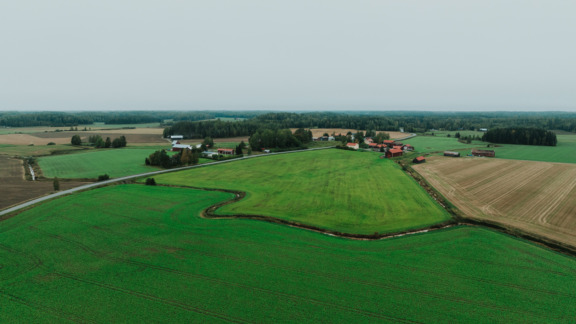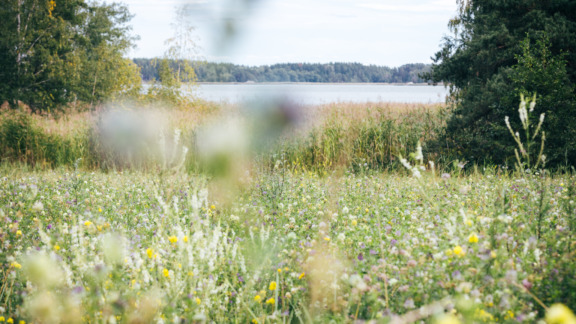Carbon Action – towards regenerative agriculture
Background
The goal of the Carbon Action platform is a systemic change towards regenerative agriculture (1, 2, 3). Regenerative agriculture enhances soil health as it restores the carbon content, which, in turn, improves productivity. It also increases biodiversity and ecosystem resilience and provides many other benefits like water infiltration and nutrient retention.
In the Carbon Action platform farmers, advisors, scientists, companies, and decision-makers work together. The platform contains several funders and projects. Carbon Action enables concrete co-operation and co-development between the different actors and projects. The holistic approach has evoked international interest.
Towards regenerative agriculture – where are we now?
Farmers and advisors: Carbon Action is farmer-based and constantly taking shape in interaction with the farmers. 100 Carbon Action Farms test practices and collect experiences. Farmers benefit directly from peer learning. For example, during the rainy winter, 2019–2020 farmers experienced the positive effects of soil management measures for water retention capacity of the soil. For Carbon Action farmers, collaboration with researchers has been valuable, and correspondingly, researchers have received practical insights from farmers.
New carbon farmers have been gained through business cooperation (see below) and through the Carbon Action Club – which is open for all farmers – and by expanding towards the Swedish-speaking farmers in Finland. The Carbon Action Club has now about 500 members. Digital learning platforms are being developed together with Reaktor, the maker of the famous Elements of AI course. Carbon Action platform also trains 30 agricultural advisors to become top experts in soil health and carbon farming.
Scientists: The Carbon Action platform brings together and conducts scientific research to e.g. enhance soil carbon sequestration. The platform contains multiple research projects and a multi-disciplinary network of researchers. Research is conducted and utilized at several levels from soil processes to climate and agricultural policies.
The hundred Carbon Action Farms test carbon farming and provide research material. The first samples from the Carbon Action farms test and control plots have been analyzed and subsequent samples will be taken after five years to measure changes. The carbon content of the first samples will soon be published in an open-access scientific journal. Also, soil samples have been taken from 30 farms to a depth of one meter and the analysis of the samples is ongoing.
More detailed field experiments studying the impacts on carbon fluxes and sequestration have been established on 20 of these Carbon Action Farms. Farmers on these farms can monitor the effectiveness of carbon farming measures at the field level, and the results are published annually on a Zenodo server (keyword ‘Carbon Action’). The results show how different plots react to droughts and heavy rains and how plants grow in different plots. The results also help farmers find ways to develop plant and soil resilience in a changing climate.
At long term study sites, both changes in soil storage and nutrient emissions are studied. The work has started this summer.
At the intensive study sites, soil analysis, microbiological analysis, atmospheric measurements, and modeling are used to study the fluxes and sequestration of carbon. Through the Carbon Action co-operation, existing study sites have been further developed (Qvidja, Viikki, Kilpiä, and Ruukki), and new ones are being established together with the University of Helsinki. In addition, long-term field experiment has been established in Viikki to study how biodiversity impacts the ability of fields to store carbon (4).
Carbon Action is developing a scientifically ambitious measurement and verification system (5, 6). The verification system uses extensively collected data and can model and predict carbon sequestration even in areas where measurement data are scarce. A Field Observatory has been created to illustrate the methods developed in the project and the results obtained from them. The Observatory is an open-access online platform for visualizing measurement data from 20 pilot Carbon farms and intensive study sites, as well as the results of carbon calculations. On a societal level, scientific verification provides a basis for agricultural and climate policy instruments and a possible carbon credit market.
Companies: Businesses have great potential in driving the adoption of regenerative farming. There are currently nine companies in the Carbon Action company platform and new ones are coming aboard.
To make carbon sequestration mainstream, businesses are needed to bring about substantial changes and to embed them permanently in the food supply chain. Businesses also communicate the message to consumers. Cooperation between the scientific community and companies is important so that science can produce solutions that are necessary and can be implemented in practice. The results of the scientific community are of interest to participating companies, as companies need to be able to base their sustainability work on researched knowledge. In the project, the companies also learn about the farmers’ needs and farmers learn about the expectations of the companies.
On the business platform, the focus is on concrete changes in the way companies operate. For example, Valio, Atria, and Altia are training their farmers in carbon farming. The sourcing of raw materials will change extensively as companies bring the principles of carbon farming into their sourcing criteria – as Altia, Apetit, and Fazer have committed to do. The first carbon farmed product has been launched by Altia, and Sinebrychoff is preparing a carbon farmed beer. Gofore aims to support Carbon Action by harnessing digitalization for regenerative agriculture. Berner develops its product portfolio so that it supports farming methods that promote soil health and carbon sequestration. The S-group supports Carbon Action research, as scientific verification of soil carbon storage is one of the missing steps in advancing carbon offsets.
At BSAG, we are constantly considering other ways in which companies can leverage the methods developed in the project to build a more sustainable business, create new business, and develop new products. There is a willingness among companies to do more. We have also invited investors and other financiers to join us in the work.
Decision-makers: The work of Carbon Action has influenced national decision-making on many levels. For example, the government program (7) and its implementation emphasizes soil carbon sequestration. We are active in working groups that prepare the national CAP strategic plan. The issue was also well on the agenda during Finland’s EU presidency – both at various events (8) and at the EU agriculture ministers meeting. In the recent climate roadmap of agricultural interest groups (MTK and SLC), the focus is on the soil.
At the EU level, Carbon Action has had an impact on the EU’s Carbon Farming Roundtable. The roundtable discussions started during Finland’s EU presidency, and the meetings have continued to be held regularly. Carbon Action has been visible both as an example and to influence the debate. At the EU level, the emphasis is on the common agricultural policy (CAP). It is important to ensure that the CAP encourages regenerative farming in order to promote climate, biodiversity, and water quality issues. In addition, voluntary carbon farming markets are piloted in collaboration with the Carbon Action platform (9). The pilot is conducted during the year 2021.
International networks: Systemic change in the field of agriculture is in progress globally. Cooperation and co-development with international regenerative agriculture networks is important for Carbon Action. Carbon Action has been well noticed as part of the forerunner networks. For example, Carbon Action has been invited to speak at the Madrid Climate Conference (4/1000 initiative event) (10). At the moment, we put emphasis on nationally implementing the new 4/1000 Strategic Plan and Horizon Europe mission ’Soil Health and Food’.
Also, Carbon Action is expanding to urban green spaces. BSAG is involved in the City of Helsinki’s ‘Transforming lawns into flower fields and urban farms’ project, which was designed by citizens and voted on to be funded by the OmaStadi budgeting. The goal is to make this a model that can be replicated in other cities.
The success of the Carbon Action work has proved to us that we have hope, and a paradigm change is possible, though not at all easy. We need to cut emissions, put a price on carbon, and make sure that nature can work – ensure that land use is based on the wellbeing of the ecosystem and human activities are regenerative. We need science, politics, NGOs, business, and citizens all aboard. And we need actions, not only words.
- Kankaanrinta, S. 2020. Carbon Action can be an example of systemic change. Carbon Action blog 10.3.2020.
- Hagelberg, E., Wikström, U., Joona, J. & Mattila, T. 2020. Regenerative Agriculture: the new direction of food production.
- Höijer, L. 2020. Systemic change – what does it mean? Carbon Action as an example. Blog 28.9.2020.
- Liski, J., Heinonsalo, J, Höijer, L. & Jarva, P. 2020. Plant biodiversity for climate – the TWINWIN project. Poster 1.10.2020.
- Höckerstedt, L. 2020. The development of a carbon sequestration verification system in the MULTA project. Carbon Action blog 15.9.2020.
- Fer, I., Gardella, A.K., Shiklomanov, A.N., Campbell, E.E., Cowdery, E.M., De Kauwe, M.G., Desai, A., Duveneck, M.J., Fisher, J.B., Haynes K.D., Hoffman, F.M., Johnston, M.R., Kooper, R., LeBauer, D.S., Mantooth, J., Parton, W., Poulter, B., Quaife, T., Raiho, A., Schaefer, K., Serbin, S.P, Simkins, J., Wilcox, K.R., Viskari, T & Dietze, M.C. 2020. Beyond Ecosystem Modeling: A Roadmap to Community Cyberinfrastructure for Ecological Data‐Model Integration. Global Change Biology
- Höijer, L. 2019. Finnish government programme takes the environmental crises seriously. Blog 10.6.2019.
- Höijer, L. 2019. Strategic research as part of Finnish EU presidency. Blog 22.10.2019.
- Kähkönen, J. 2020. LIFE CarbonFarmingScheme. Poster 1.10.2020.
- Höijer, L. 2019. Carbon Action at 4/1000 day at Madrid COP25. Blog 16.12.2019
Laura Höijer / BSAG, Eija Hagelberg / BSAG, Michaela Ramm-Schmidt / BSAG, Kaj Granholm / BSAG and Jari Liski / Finnish Meteorological Institute



